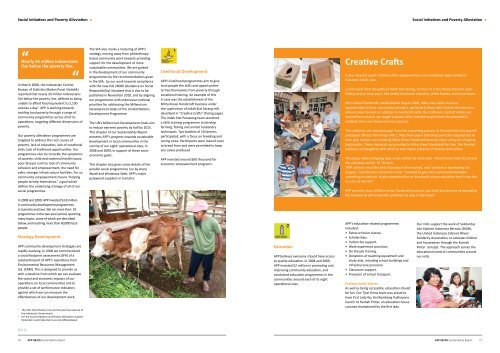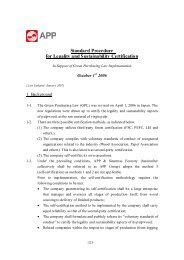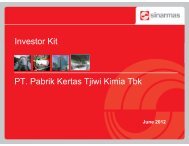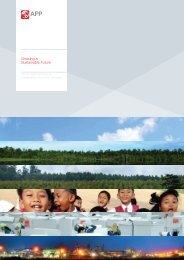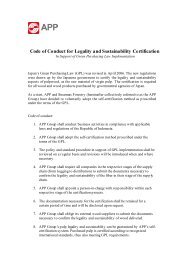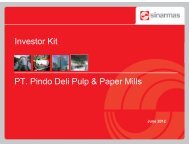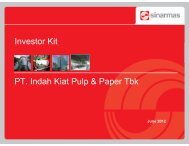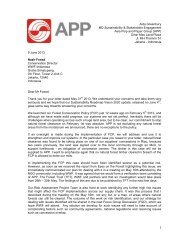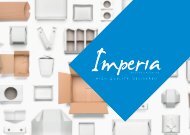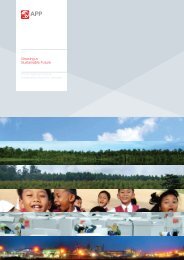APP Sustainability Report 2008-2009 - Asia Pulp and Paper
APP Sustainability Report 2008-2009 - Asia Pulp and Paper
APP Sustainability Report 2008-2009 - Asia Pulp and Paper
You also want an ePaper? Increase the reach of your titles
YUMPU automatically turns print PDFs into web optimized ePapers that Google loves.
Social Initiatives <strong>and</strong> Poverty Alleviation<br />
Social Initiatives <strong>and</strong> Poverty Alleviation<br />
“<br />
Nearly 35 million Indonesians<br />
live below the poverty line.<br />
“<br />
In March <strong>2008</strong>, the Indonesian Central<br />
Bureau of Statistics (Badan Pusat Statistik)<br />
reported that nearly 35 million Indonesians<br />
live below the poverty line, defined as being<br />
unable to afford food equivalent to 2,100<br />
calories a day 1 . <strong>APP</strong> is working towards<br />
tackling local poverty through a range of<br />
community programmes across all of its<br />
operations, targeting different dimensions of<br />
poverty.<br />
Our poverty alleviation programmes are<br />
targeted to address the root causes of<br />
poverty: lack of education, lack of vocational<br />
skills, lack of livelihood opportunities. Our<br />
programmes also try to tackle the symptoms<br />
of poverty: child <strong>and</strong> maternal health issues,<br />
poor disease control, lack of community<br />
cohesion <strong>and</strong> empowerment, the need for<br />
safer, stronger infrastructure facilities. For us,<br />
community empowerment means “helping<br />
people to help themselves,” a goal which<br />
defines the underlying strategy of all of our<br />
social programmes.<br />
In <strong>2008</strong> <strong>and</strong> <strong>2009</strong>, <strong>APP</strong> invested $3.8 million<br />
in community development programmes<br />
in Sumatra <strong>and</strong> Java. We ran more than 55<br />
programmes in the two-year period, spanning<br />
many topics, some of which are described<br />
below, <strong>and</strong> reaching more than 60,000 local<br />
people.<br />
Strategy Development<br />
<strong>APP</strong> community development strategies are<br />
rapidly evolving. In <strong>2008</strong> we commissioned<br />
a social footprint assessment (SFA) of a<br />
substantial part of <strong>APP</strong>’s operations from<br />
Environmental Resources Management<br />
Ltd. (ERM). This is designed to provide us<br />
with a baseline from which we can evaluate<br />
the social <strong>and</strong> economic impacts of our<br />
operations on local communities <strong>and</strong> to<br />
provide a set of performance indicators<br />
against which we can measure the<br />
effectiveness of our development work.<br />
1<br />
The UN’s Food Poverty Line <strong>and</strong> the poverty measure of<br />
the Indonesian Government.<br />
2<br />
For the Social Initiatives <strong>and</strong> Poverty Alleviation chapter,<br />
Pindo Deli I <strong>and</strong> Pindo Deli II are not differentiated.<br />
The SFA also marks a maturing of <strong>APP</strong>’s<br />
strategy, moving away from philanthropybased<br />
community work towards providing<br />
support for the development of more<br />
sustainable communities. We are guided<br />
in the development of our community<br />
programmes by the recommendations given<br />
in the SFA, by our work towards compliance<br />
with the new ISO 26000 (Guidance on Social<br />
Responsibility) St<strong>and</strong>ard that is due to be<br />
published in November 2010, <strong>and</strong> by aligning<br />
our programmes with Indonesian national<br />
priorities for addressing the Millennium<br />
Development Goals of the United Nations<br />
Development Programme.<br />
The UN’s Millennium Development Goals aim<br />
to reduce extreme poverty by half by 2015.<br />
This chapter of our <strong>Sustainability</strong> <strong>Report</strong><br />
presents <strong>APP</strong>’s progress towards sustainable<br />
development in local communities in the<br />
vicinity of our eight 2 operational sites, in<br />
<strong>2008</strong> <strong>and</strong> <strong>2009</strong>, in support of these socioeconomic<br />
goals.<br />
This chapter also gives some details of the<br />
parallel social programmes run by Arara<br />
Abadi <strong>and</strong> Wirakarya Sakti, <strong>APP</strong>’s major<br />
pulpwood suppliers in Sumatra.<br />
Livelihood Development<br />
<strong>APP</strong>’s livelihood programmes aim to give<br />
local people the skills <strong>and</strong> opportunities<br />
to free themselves from poverty through<br />
vocational training. An example of this<br />
in Java was the establishment of the<br />
Mitra Kreasi H<strong>and</strong>icraft business under<br />
the supervision of Indah Kiat Serang mill,<br />
described in “Creative Crafts” (facing page).<br />
The Indah Kiat Perawang team launched<br />
a skills training programme to develop<br />
farming, fishing <strong>and</strong> animal husb<strong>and</strong>ry<br />
techniques. Two batches of 10 farmers<br />
participated, with a focus on breeding <strong>and</strong><br />
raising cows. Participants were loaned cows<br />
to breed from <strong>and</strong> were permitted to keep<br />
any calves produced.<br />
<strong>APP</strong> invested around $60 thous<strong>and</strong> for<br />
economic empowerment programs.<br />
Education<br />
<strong>APP</strong> believes everyone should have access<br />
to quality education. In <strong>2008</strong> <strong>and</strong> <strong>2009</strong>,<br />
<strong>APP</strong> invested $2 million in promoting <strong>and</strong><br />
improving community education, <strong>and</strong><br />
conducted education programmes in the<br />
communities around each of its eight<br />
operational sites.<br />
Creative Crafts<br />
A new recycled paper initiative offers empowerment <strong>and</strong> vocational opportunities in<br />
Pabuaran Indah, Java.<br />
A short walk from the gates of Indah Kiat Serang, six men sit in the shade around a table<br />
folding factory scrap paper into neatly h<strong>and</strong>made calendars, photo frames, <strong>and</strong> tissue boxes.<br />
Mitra Kreasi H<strong>and</strong>icraft, established in August <strong>2009</strong>, offers new micro business<br />
opportunities to local community members, particularly those with limited education but<br />
who are keen to work. In addition to h<strong>and</strong>icraft skills, the craftsmen, each of whom was<br />
trained from scratch, are taught business skills intended to give them the potential to<br />
establish their own future micro businesses.<br />
The craftsmen use rejected paper from the converting process at the Indah Kiat Serang mill<br />
<strong>and</strong> paper off-cuts from <strong>Paper</strong> Mill 1. Plies from paper rolls that cannot be recycled due to<br />
their glue content are reused by Mitra Kreasi H<strong>and</strong>icraft to make paper string for shopping<br />
bag h<strong>and</strong>les. These materials are provided to Mitra Kreasi H<strong>and</strong>icraft for free. The finished<br />
products are bought by <strong>APP</strong>, which in turn makes presents of them to mill visitors.<br />
The group makes shopping bags which sell for 50 cents each. Photo frames fetch $2.50 <strong>and</strong><br />
the calendars sell for $1.70 each.<br />
“<strong>APP</strong> advised me of the kind of products they wanted, <strong>and</strong> I worked on developing the<br />
designs,” said founder <strong>and</strong> owner Farid. “I wanted to give local community members<br />
something to work on; to give opportunities to the people whose education level is too low<br />
to work at the mill.”<br />
<strong>APP</strong> currently buys all Mitra Kreasi H<strong>and</strong>icraft products, but Farid also dreams of exp<strong>and</strong>ing<br />
the business to sell to outside customers as well, in the future.<br />
<strong>APP</strong>’s education-related programmes<br />
included:<br />
• Extracurricular classes.<br />
• Scholarships.<br />
• Tuition fee support.<br />
• Work experience provision.<br />
• On the job training.<br />
• Donations of teaching equipment <strong>and</strong><br />
study aids, including school buildings <strong>and</strong><br />
infrastructure provision.<br />
• Classroom support.<br />
• Provision of school transport.<br />
Extracurricular classes<br />
As well as being accessible, education should<br />
be fun. Our Tjiwi Kimia team was proud to<br />
have First Lady Ibu Ani Bambang Yudhoyono<br />
launch its Rumah Pintar, an education house<br />
concept championed by the first lady.<br />
Our mills support the work of Solidaritas<br />
Istri Kabinet Indonesia Bersatu (SIKIB),<br />
the United Indonesia Cabinet Wives’<br />
Solidarity Association, to educate children<br />
<strong>and</strong> housewives through the Rumah<br />
Pintar concept. The approach serves the<br />
educational need of communities around<br />
our mills.<br />
[SO 1]<br />
76 <strong>APP</strong> 08/09 <strong>Sustainability</strong> <strong>Report</strong> <strong>APP</strong> 08/09 <strong>Sustainability</strong> <strong>Report</strong> 77


